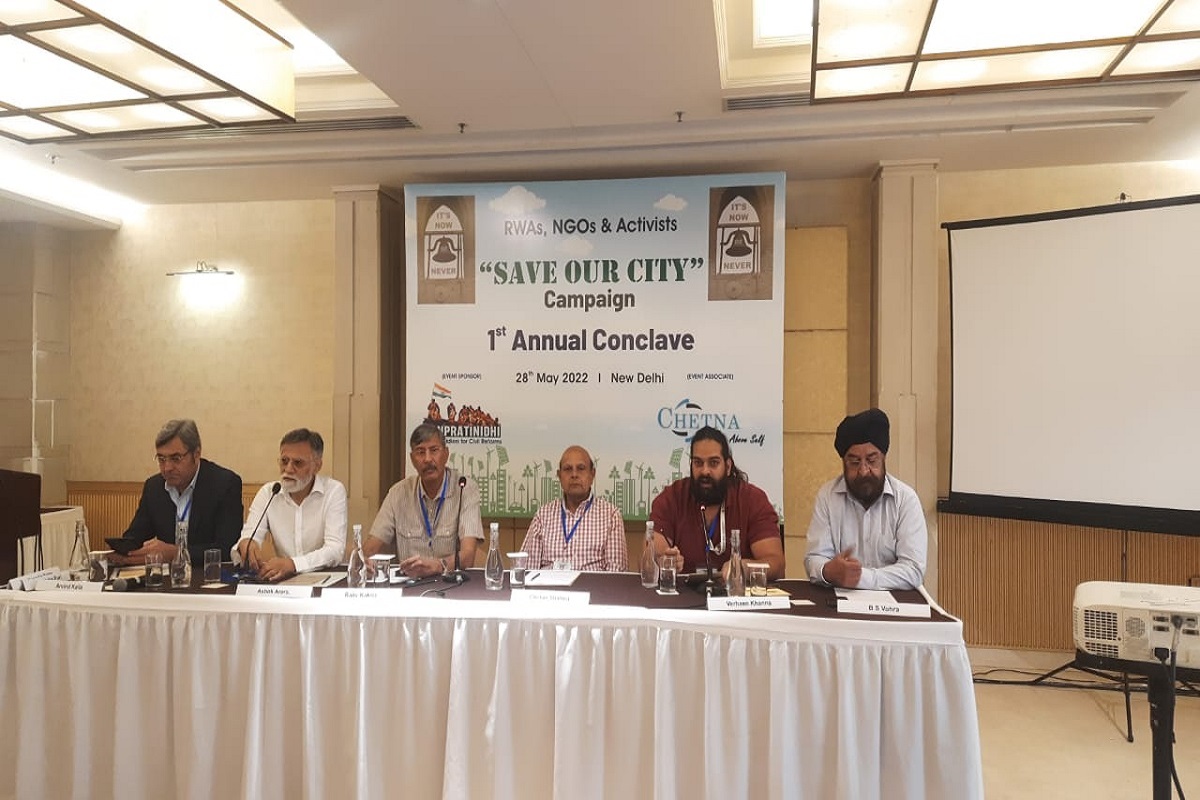Who is responsible for the physical loss or damage to the property that happened while walking on the road? Can the municipal corporations be fixed for improper roads leading to accidents or death? We can, but the legal relief through tort is a very time-consuming and tedious process where municipal corporations can be made the party and dragged to the court.
Can there be a law that directly fixes the onus on the municipal corporations for the bad roads, improper sanitation, overflowing drains, poor upkeep of the surroundings etc for which every citizen pays heavy taxes from their hard-earned money. The time for ‘Municipal Liability Law’ (MLL) has come, was the collective voice of citizens in a day-long conclave organised by Save Our City foundation.
In the wake of unification of municipal corporations in the National capital Delhi, resident welfare associations, civil societies and stakeholders have joined hands to push for ‘Municipal Liability Law’ where municipalities are accountable for the fault lines in the system.
Advertisement
To fill the gap in the system various citizens’ forum, NGOs and RWAs under the aegis of Save Our City Campaign have come together to draft a strong ‘Municipal Liability Law’. The draft ‘Municipal Liability Law’ would be presented to the government with a “clause of accountability” so that municipal corporations can be directly held responsible for the “job they are supposed to do, are well paid for but mostly go scot-free in case of defaults due to tedious and lengthy court procedures.
“Residents pay a heavy tax for what? For the proper roads, sanitation, sewage, and other facilities and their upkeeps. Why should we pay for the inefficiency of these municipalities? Points out Anil Sood, the convenor of Chetna, an NGO and a partner of the consortium of citizen forums that gathered in Delhi to discuss the draft of MLL during the day-long conclave.
Rajiv Kakria, a civil society activist and the founder of Save Our City has been raising issues about the inefficiency of municipal bodies emphasises, that there is a “crying need for Enactment of ‘Model Municipal Liability Act’ to reign in Corruption, inefficiency, poor quality of materials, workmanship, and service.”
“This is high time to tame this ‘unleashed tiger’ i.e municipality”, was the common echo of the residents’ forums. “A serious structural reform needs to be undertaken to improve the Revenue generation of the municipalities, Operational Efficiency, Quality of Materials, Workmanship and Service besides holding Bureaucrats accountable to the citizens with Penal Provisions,” demanded Rajiv Kakria.
The issue isn’t only about the infrastructure and its upkeep, absence of any accountability of municipal corporations is putting load on the entire ecosystem.
“It is not about proper roads and their upkeep only. The capital is expanding beyond its limit which is putting pressure on everything. The absence of green open space in NCR is a big issue. There are places where there is no public park with a population of 8 lakh people. Pollution in the capital is crippling children with defective lungs,” said Dewan Singh, a social activist who works on water issues.
Dewan Singh demanded that the land pooling scheme should be immediately stopped for some time. Dewan Singh emphasized that urban farmers should be incentivized for social forestry instead of being promoted for land pooling because the green cover is diminishing adding to the woes of pollution. He demanded that the proposed law should consider how the municipalities could also be made accountable for the upkeep of the environment as it is an important part of the citizen’s lives.
Senior Supreme Court advocate N Ganpati said that municipal liability should extend to every government. “ If there are no proper signages for night hours, who is responsible and who else could be held responsible for non-functional traffic lights if not the municipalities. There are many issues like dysfunctional jogging tracks which lead to accidents. If someone falls and injures on the road, I consider it as a criminal liability”, said Ganpati emphasising that Municipal Liability Law is a must. “Clause of accountability”, was the demand of Chetan Sharma, an activist.
Besides the civic issues and infrastructural accountability which is demanded from the municipalities, there was a demand for making municipal bodies responsible for the environment and ecological upkeep.
“It is up to the municipal department to see what kind of trees are required for the ecological upkeep of the city. We need a balance. Not every open space needs to be developed and pruned. We need big trees, we need shrubs, foliages, creepers, everything,” emphasized Vishaish Uppal, Director, Governance, Law, and Order , WWF, adding that open spaces need to have their own random green cover for a good ecology.
Arvind Kaila, founder, Janpratinidhi, an NGO, also emphasised that manifestos of political parties should also be made legally binding and money should be spent only on developing welfare schemes and infrastructures and not be doled out as freebies to buy votes.
The consortium resolved that rather than just proposing such a law they would draft a ‘strong Municipal Accountability Law’ and send it across to the government.
Advertisement











